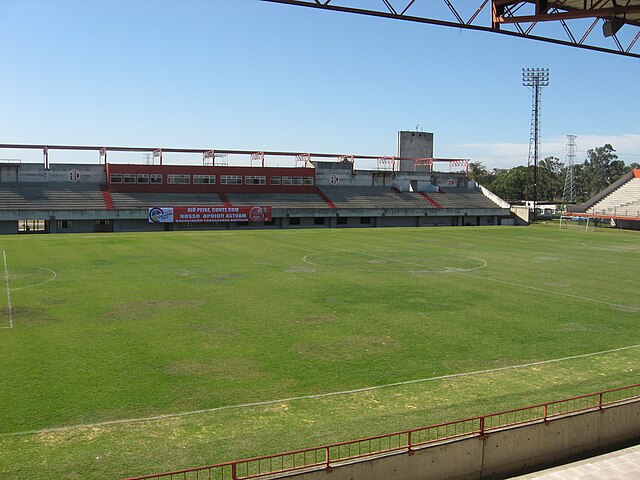Loading AI tools
Brazilian association football club From Wikipedia, the free encyclopedia
America Football Club, usually abbreviated to America-RJ or simply America, is a Brazilian football team based in the city of Rio de Janeiro, in the northern neighborhood of Tijuca. The team compete in Campeonato Carioca, the top tier of the Rio de Janeiro state football league.
 | ||||
| Full name | America Football Club | |||
|---|---|---|---|---|
| Nickname(s) | AFC Mecão Diabo (Devil) Rubro Carioca (Rio's Reds) Sangue (Blood) | |||
| Founded | 18 September 1904 | |||
| Ground | Estádio Giulite Coutinho | |||
| Capacity | 13,544 | |||
| President | Romário | |||
| Head coach | Josué Teixeira | |||
| League | Campeonato Carioca | |||
| 2021 | Carioca | |||
| Website | http://www.americario.com.br/ | |||
|
| ||||





Founded on 18 September 1904, the club competed in the Campeonato Brasileiro Série A several times, winning the state championship seven times. The club's home stadium is the Estádio Giulite Coutinho, which has a capacity of 16,000. They play in red shirts, white shorts and red socks.
The football anthem composer Lamartine Babo was a supporter of America.[1] America's mascot is a devil. America also sponsors a beach American football team, the America Red Lions.[2]
On 18 September 1904, Alberto Koltzbucher, Alfredo Guilherme Koehler, Alfredo Mohrsted, Gustavo Bruno Mohrsted, Henrique Mohrsted, Jayme Faria Machado and Oswaldo Mohrsted founded America Football Club.[3] In 1905, America, together with Bangu, Botafogo, Petrópolis, Fluminense and Futebol Atlético Clube founded Liga de Football do Rio de Janeiro (Rio de Janeiro Football League), which was the first football federation of Rio de Janeiro.[3] In 1913, the club won the state championship for the first time.[4]
For the 1971 season, the club competed in the national Championship's first edition, finishing in 11th place.[5]
The yellow star just above their emblem represents their win in the Tournament of the Champions (Torneio dos Campeões) in 1982, which was a tournament organized by CBF to serve as a preview to the Campeonato Brasileiro Série A tournament. Flamengo declined the invitation so America, the team with the best record after the selected teams, was invited to fill the spot. America won the tournament by beating Guarani in overtime at Maracanã stadium.[6]
In 2006, America was the runner-up of Taça Guanabara. America played the final against Botafogo.[7]
In 2008, America suffered a major blow by being relegated to the Second Division of the Campeonato Carioca. However, they won the Second Division in 2009, thus being promoted to the first level in 2010.[8] However, the club were relegated again in 2011 and continues playing the Second Division in 2015, returns to the elite of the Campeonato Carioca after five years vying for the Serie B, after beating the Americano.[9]
According to the CBF register.

Note: Flags indicate national team as defined under FIFA eligibility rules. Players may hold more than one non-FIFA nationality.
|
|
One controversial aspect of the club is the official mascot: the Diabo (devil), depicted as a red demon complete with horns, pointy beard, curled moustache, a long fat arrow-pointed tail, hooved feet and a black cape. The club's old stadium was nicknamed Caldeirão do Diabo ("Devil's Cauldron"). In 2006 some of the club's fans, supported by then-manager Jorginho who is an Evangelical Christian, attempted to replace the diabo with a bald eagle, claiming that the devil was "unlucky". However, as the "diabo" is a traditional part of the club's story and with the original mascot the club conquered its greatest achievements and there was no change in the club's fortunes with the new mascot, the replacement was abandoned and it was considered that Jorginho's opinion was motivated by "religious fanaticism".[10]
America is the Brazilian club with the largest number of other clubs named after it. It has homonyms in Natal, São José do Rio Preto, Três Rios, Manaus, Teófilo Otoni and Fortaleza.[11]
Seamless Wikipedia browsing. On steroids.
Every time you click a link to Wikipedia, Wiktionary or Wikiquote in your browser's search results, it will show the modern Wikiwand interface.
Wikiwand extension is a five stars, simple, with minimum permission required to keep your browsing private, safe and transparent.